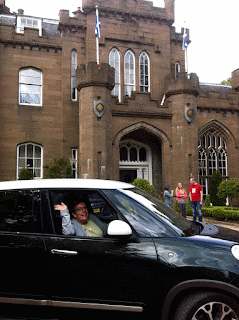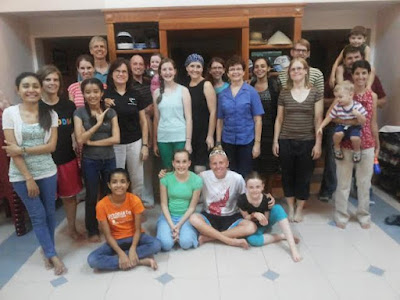- While I used to find late slips and paperclips in my pockets, I now find them filled with plastic dinosaurs and acorns and sparkly jewels.
- While I used to ask myself each morning, "Can this outfit handle flood waters, hot season power outages, and/or blustery moto rides?" I now ask myself, "Can this outfit handle holding a small child with muddy flip-flops, crawling through a playground tunnel, and/or supervising a painting activity?"
Yes, indeed, I've switched from teaching high school in urban Cambodia to nannying in suburban Pennsylvania - in fact, right down the road from my parents' house. It's been so fun (albeit sometimes draining) getting to know these three kids the past few months. Let me introduce them to you.
Caely (age 8)
(short for "Michaela")
(short for "Michaela")
Greatest joy: her
dog, Kena. Caely thinks every song gets better if you replace a key word with “Kena,”
and frequently tells me stories about how Kena was her first-ever friend as
an infant.
Not a fan of…
Aiden being in her room. Since his recent escapades include smearing calamine lotion on her
bed and conditioner on her beloved plush horse, I can’t totally blame her.
Big enough to… persuade her siblings to do nearly anything. Thankfully she uses that latter power for good... usually.
Small enough to… get
nervous about the addition problems in her summer math packet.
Wants to be... a chef. She can already make tasty spaghetti sauce from scratch without a recipe!
Quotable quote (about the little girl in Blueberries for Sal): “She ate blueberries the whole way up the hill? She must have been really poor!” (This from a girl who likes blueberries, by the way.)
Greatest joy: snuggling.
And running around. Sometimes in quick succession.
Not a fan of… long "quiet times" (napping/reading) after lunch. He always makes me promise it will be short, even though he's usually sound asleep when I come to get him up afterward.
Big enough to… swing
on his own, as of mid-June, but he still likes when I push him. I’ve compromised with him:
every other time he starts, I start him.
Small enough to… put everything in his mouth. His T-shirt collar. Toys. Playing cards. Things he finds on the ground outside.
Wants to be... a worker who builds houses, and lawnmowers, and school buses. (These were all in view when I asked him. Last time I asked, he said "a police.")
Quotable quote: “I can pet your dog?!” This is his plaintive call to every dog owner he sees in the parks and neighborhood, no matter how often I have him rephrase it as "May I please pet your dog." All three kids drop everything and come running whenever a dog comes into view.
Quotable quote: “I can pet your dog?!” This is his plaintive call to every dog owner he sees in the parks and neighborhood, no matter how often I have him rephrase it as "May I please pet your dog." All three kids drop everything and come running whenever a dog comes into view.
Greatest joy: being
pushed on the swings. (It has to start like this: "Are you ready? Are you really really ready? Are you SUPER-DUPER-ready? OK, here we go!") Also, chapter books about fairies. She'd check out twenty a week from the library if I let her, just because the covers are pretty and she knows Caely likes them.
Not a fan of… being
left behind. She may be the youngest, but she hates it when she’s the slowest!
Big enough to… scale the playground climbing wall, and to zip
around on her scooter like a champ. She's pretty agile - maybe it's related to the previous point.
Small enough to… insist
on having someone accompany her into the bathroom. Every. Time.
Wants to be... a policeman. Or maybe a fireman. Or a worker like Aiden.
Quotable quote: I took her to the doctor yesterday for a rash. She was pretty nervous, since her last doctor's visit involved a gash in her eyebrow that required five stitches. But Caitlin was very cooperative in yesterday's appointment, and the doctor quickly diagnosed the rash. As the doctor walked out of the room, Caitlin muttered in a disgusted voice, "That was boring."
They jumped at the chance to introduce themselves to my friends and family...
Since my grad courses started last week, I'm trying to tide them over until their school starts late next week, but very thankful that their family is flexible regarding my hours. I'm hoping to continue several times a week, after Caely and Aiden arrive home from school (3rd grade and preschool, respectively). These kids are so lovable, and they've quite effectively wormed their way into my heart!



































